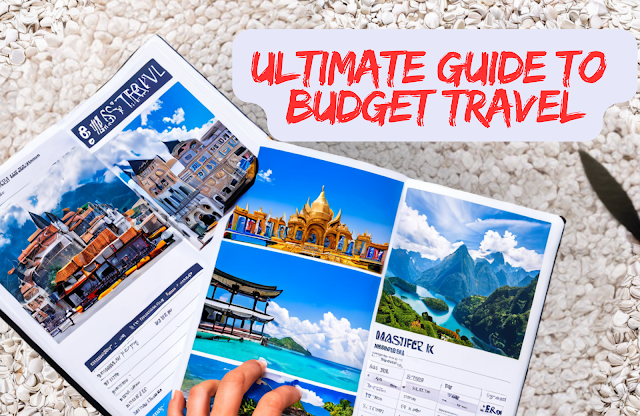Ultimate Guide to Budget Travel: Tips for Exploring the World Affordably
Traveling doesn’t have to break the bank. With a bit of planning, creativity, and flexibility, anyone can experience the beauty of the world without overspending. Whether you’re a backpacker, a digital nomad, or a casual traveler, this comprehensive guide will offer you actionable tips to help you travel affordably, without sacrificing comfort or experience. Let’s dive into the essential strategies for budget travel that will allow you to explore the globe while keeping your finances in check.
1. Plan Ahead but Stay Flexible
The importance of planning: One of the first steps in budget travel is planning your trip well in advance. Early planning allows you to:
- Take advantage of discounts on flights, accommodation, and activities.
- Avoid peak tourist seasons that drive prices up.
- Budget more accurately for your trip.
Stay flexible for last-minute deals: While planning ahead is crucial, being flexible with your travel dates can significantly reduce your costs. Use flight comparison tools like Google Flights or Skyscanner, and search for the cheapest months or days to fly. If your schedule allows for flexibility, you can take advantage of last-minute deals on flights or accommodation.
2. Choose Budget-Friendly Destinations
Certain destinations are naturally more budget-friendly than others. Countries in Southeast Asia (e.g., Thailand, Vietnam), Eastern Europe (e.g., Bulgaria, Ukraine), and Central and South America (e.g., Mexico, Colombia) offer a lower cost of living without compromising on incredible experiences.
How to choose the right destination:
- Consider exchange rates: A favorable exchange rate can make your travel budget stretch further.
- Research local costs: Look into the cost of accommodation, food, and transportation in your target destination to avoid surprises.
- Avoid high-cost regions: Places like Scandinavia, Switzerland, and major cities like London or New York are generally more expensive to visit.
3. Save on Flights
Use flight comparison sites: Always compare flight prices across multiple platforms before booking. Websites like:
- Google Flights – Offers a flexible date calendar and price trend insights.
- Skyscanner – Scans a wide range of airlines and travel agencies.
- Momondo – Useful for finding lesser-known, budget airlines.
Book at the right time: Studies suggest that booking your flight around 6-8 weeks before departure gives you the best chance of securing a deal. Additionally, mid-week flights (Tuesday or Wednesday) are often cheaper than weekend flights.
Opt for budget airlines: Budget airlines like Ryanair, AirAsia, and Southwest Airlines often offer lower fares than major carriers. While the service may be more basic (no free meals or entertainment), the savings can be significant, especially for short-haul flights.
Don’t overlook stopovers: While direct flights are more convenient, flights with one or more stopovers can be considerably cheaper. If you’re not in a rush, consider taking a flight with a layover to save money.
4. Affordable Accommodation Options
Hostels and Guesthouses: Hostels are a top choice for budget travelers. Websites like Hostelworld and Booking.com allow you to filter results by price, location, and amenities. Many hostels offer private rooms if you prefer privacy but still want to benefit from lower rates.
Couchsurfing: Couchsurfing is a global community where travelers can stay with locals for free. Beyond saving money, it also provides a unique opportunity to connect with locals and get insider tips on the destination.
Airbnb and Vacation Rentals: Airbnb and similar platforms offer an alternative to hotels and hostels. Vacation rentals can be more affordable, especially if you’re staying in a group or for an extended period. Opt for places with kitchen facilities so you can prepare your own meals and save on dining out.
House-sitting or Pet-sitting: House-sitting involves looking after someone’s home (and sometimes their pets) while they’re away, in exchange for free accommodation. Websites like TrustedHousesitters or HouseCarers match homeowners with travelers looking for a place to stay. It’s a great way to cut accommodation costs completely.
5. Eat Like a Local
Avoid tourist traps: Restaurants in tourist hotspots often have inflated prices. To save money and experience authentic local cuisine, venture off the beaten path. Street food vendors and local eateries are often much cheaper and offer a more authentic experience.
Cook your own meals: If you have access to a kitchen (e.g., in a hostel or vacation rental), buy groceries and cook your own meals. Visit local markets to get fresh produce at lower prices. This can significantly cut down on food costs, especially in countries where dining out is expensive.
Look for local deals: Many restaurants offer set menus or lunch specials, which provide great value. In some places, eating a large meal during lunch and a lighter dinner can help you save.
Use food-sharing apps: In some cities, food-sharing apps like Too Good To Go allow you to purchase unsold food from restaurants and bakeries at a discount.
6. Budget Transportation
Use public transport: Public buses, trams, and metro systems are usually far cheaper than taxis or rideshares. In many cities, you can buy a day pass or weekly pass that offers unlimited travel on public transport.
Consider walking or biking: Not only is walking or biking free, but it’s also a great way to explore a city at your own pace. Many destinations now offer bike rental services, and some hostels even provide bikes for free.
Overnight buses or trains: For longer journeys, overnight buses or trains can save you a night’s accommodation. This option is popular in regions like Southeast Asia or Europe, where sleeper buses or trains are common and affordable.
Carpooling and ride-sharing apps: Services like BlaBlaCar allow travelers to share car rides with locals, often at a lower cost than taking a bus or train. It’s a great way to meet new people and save on transportation costs.
7. Use Travel Rewards and Loyalty Programs
Collect frequent flyer miles: If you travel frequently, sign up for frequent flyer programs with airlines. Over time, you can accumulate miles that can be redeemed for free or discounted flights.
Credit card rewards: Certain credit cards offer travel rewards points for every purchase. Some cards even offer free travel insurance or airport lounge access. Make sure to choose a card that suits your travel style and doesn’t have high foreign transaction fees.
Hotel loyalty programs: If you frequently stay at chain hotels, consider joining their loyalty programs. You’ll earn points for each stay, which can eventually be redeemed for free nights or other perks.
8. Free Activities and Attractions
Explore nature: Many natural attractions, such as beaches, hiking trails, parks, and mountains, are free or cost very little to access. National parks may charge a small entry fee, but they offer great value for a full day of outdoor adventure.
Free walking tours: Many cities offer free walking tours led by local guides. These tours are usually tip-based, so while they are not entirely free, you can choose how much to pay based on your budget.
Museum discounts or free days: Some museums and galleries offer free entry on certain days or during specific hours. Look into cultural passes or city cards that provide discounted access to multiple attractions.
Join local festivals or events: Research local events happening during your stay. Festivals, parades, or cultural celebrations often offer free entertainment and give you a deeper insight into the local culture.
9. Travel Insurance – Don’t Skip It
While it may seem counterintuitive to spend money on travel insurance while budgeting, it’s essential. Medical emergencies, lost luggage, or canceled flights can end up costing you far more than the insurance premium. Look for affordable travel insurance plans that cover the basics (e.g., medical emergencies, trip cancellations). Websites like World Nomads or SafetyWing offer comprehensive and affordable insurance options for budget travelers.
10. Travel with a Group
Traveling with friends or family allows you to share the costs of accommodation, transportation, and meals. Group discounts are often available for tours or attractions, and splitting the cost of larger vacation rentals can make accommodation more affordable than solo travel.
11. Work While Traveling
Freelancing or Remote Work: With the rise of the digital nomad lifestyle, many travelers work while they explore new destinations. If you have skills that can be monetized remotely (e.g., writing, web development, graphic design), freelancing can help fund your travels.
Work exchange programs: Websites like Workaway, WWOOF, and HelpX connect travelers with hosts who need help in exchange for free accommodation and meals. Common tasks include farm work, teaching, or helping in hostels.
12. Make Use of Local SIM Cards and Wi-Fi
Get a local SIM card: Roaming charges can be exorbitant, especially if you’re traveling internationally. Purchasing a local SIM card is often cheaper and provides better connectivity. Make sure your phone is unlocked before leaving your home country.
Use free Wi-Fi whenever possible: Most cafes, restaurants, libraries, and public spaces offer free Wi-Fi. Download maps and information for offline use whenever possible to save on data usage.
13. Track Your Expenses
Use budgeting apps: Apps like Trail Wallet or TravelSpend allow you to track your travel expenses in real time. By knowing exactly how much you’re spending, you can adjust your budget accordingly and avoid surprises.
Stick to a daily budget: Setting a daily budget for yourself helps prevent overspending. This is especially useful for longer trips where managing your funds over an extended period is crucial.

